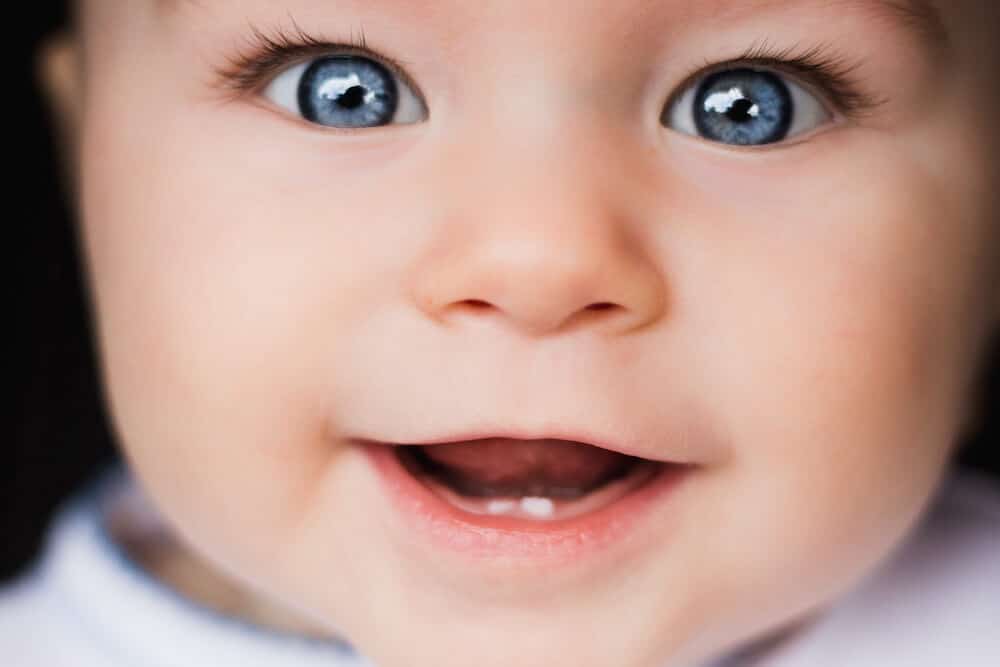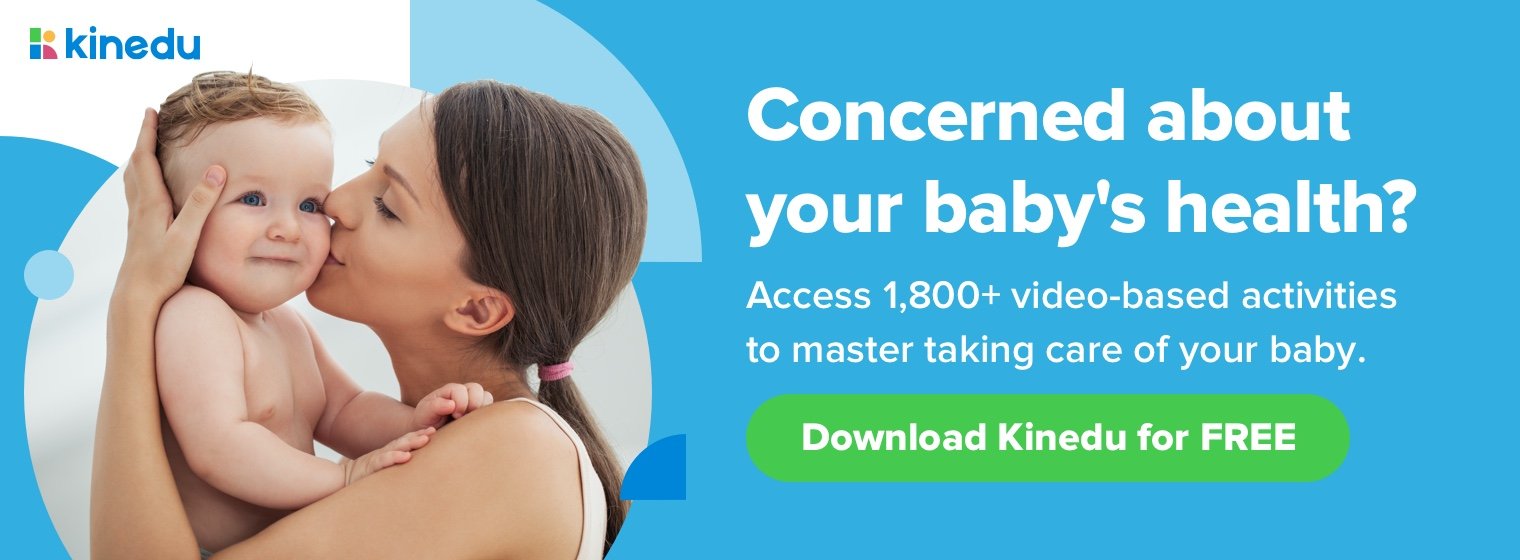When do babies start teething? Learn when to expect your baby’s first tooth and how to help comfort your child through teething.
You probably feel like there are so many things to keep track of when it comes to your new baby’s development. As a new parent, you are always wondering what to look for and what comes next.
You may have noticed your baby is a little more fussy than usual. Maybe they are drooling a lot or having trouble sleeping. Whatever has you wondering about when babies start teething, you’ve come to the right place. We’re discussing everything you need to know about your baby’s first tooth, teething, and dental care for your baby.
Signs Your Baby Is Teething
There is a wide range of ages for when you can expect your baby to start teething. Most babies will have their first tooth emerge between 6 and 12 months old. However, it is not uncommon for some babies to begin teething and produce a tooth earlier, around 3-4 months old.
Download Kinedu to track your baby’s milestones and progress!
While there is no definitive way to anticipate exactly when your baby will cut their first teeth, there are some classic signs that your baby is teething. Teething symptoms can begin months before your baby’s first tooth, and some babies won’t show any signs that their first tooth is about to erupt.
The most common signs of baby teething are:
- Drooling – Babies will often begin drooling anywhere between 2 ½ months and 4 months old. You can expect drooling to continue throughout your baby’s teething process. You may even be surprised by just how much drool your baby can produce during this time. Bibs can help to keep your baby’s clothes dry and keep them more comfortable.
- Teething Rash – All that drooling can cause irritation and chafing around your babies mouth, chin, and neck. Wiping away the drool can help prevent irritation, and barrier creams such as Vaseline and Aquaphor can provide added protection to their sensitive skin.
- Coughing and Gagging – If your baby isn’t showing symptoms of a cold or flu, then it is very likely that you baby’s onset of coughing and gagging is directly related to the excess drooling caused by teething.
- Biting – You may have noticed that your baby is putting their hands or other objects into their mouths more frequently. They may also start biting on your fingers or their own fists. Teething causes pressure to build up in your baby’s gums and chewing and biting provides relief through counterpressure. Your baby will try and chew on anything that is available to them. Cold washcloths and frozen teething rings can provide extra relief and a safer option to help alleviate your baby’s discomfort.
- Behavioral Changes – Your baby may experience irritability and express their discomfort through crying and whining. Your baby’s first teeth are the most painful to erupt. The swelling in their gums and pain while the tooth is breaking through can all contribute to your baby being fussier than usual.
- Pulling on their ears and rubbing their cheeks – Because teething causes inflammation in the gums and pain in your baby’s jaw, your little one may also feel discomfort in their ears and cheeks. This is because they all sit along the same nerve pathway. It is common for babies that are teething to pull at their ears and rub their cheeks to try and alleviate their discomfort.
- Disrupted Sleep – You might feel like you have just settled into a predictable sleeping schedule with your baby, when all of a sudden they are waking in the middle of the night and are having trouble settling back to sleep. Teething commonly interrupts a baby’s sleep.
Other signs that your baby is teething include changes in eating as well as swollen lumps, known as hematomas, appearing on your baby’s gums.
What Order Do Baby Teeth Come In?
Your baby’s first teeth to come in will be their central incisors. These are the first two teeth in the center of their mouth. Usually the bottom central incisors will come in first, followed by the ones on the top.
The rest of your baby’s teeth will likely follow this timeline:
- 9-13 months – Lateral incisors (the teeth next to the middle)
- 13-19 months – First molars (the baby teeth closest to the opening of the mouth)
- 16-23 months – Canines or Cuspids (the teeth next to the lateral incisors)
- 23-33 months – Second molars (the teeth in the back of the mouth)
You can expect your baby to have all their teeth by the time they are 3 years old.
Ways To Help Alleviate Teething Symptoms
Now that you know what you can expect when your baby starts teething, when the time comes you will also want to be prepared to help alleviate some of your baby’s symptoms and discomfort.
There are so many teething remedies on the market today. To help soothe your baby while you wait for their first tooth, it is important to make sure you are using safe and effective remedies for your baby.
Download Kinedu to get individual guidance from experts in early childhood development!
Stay away from numbing agents, amber necklaces, and over the counter teething gels. Safe teething remedies include:
- Pain relievers: acetaminophen (if your baby is over 2 months) or ibuprofen (if your baby is over 6 months)
- Gum massage
- Vibrating teethers
- Refrigerated teethers
- Cold washcloths
- Plush teething toys
- Distractions
Caring For Your Baby’s First Teeth
Once your baby has their first tooth, you will need to start providing proper dental care. Starting proper dental hygiene as soon as possible can help your baby become accustomed to brushing and the dentist, as well as keep their teeth and gums healthy.
Fluoride
Fluoride is an important mineral that helps to protect your baby’s teeth and prevent their teeth from decay. At around 6 months of age, your pediatrician may recommend adding fluoride to your baby’s diet, especially if your water does not contain any.
Brushing
As soon as your baby has their first tooth, you should begin brushing their teeth twice a day with a baby toothbrush and a small smear of fluoride toothpaste. This is especially important once your baby is done eating and drinking for the day.
Visit The Dentist
You should call and schedule a pediatric dentist appointment as soon as your baby has their first tooth. A pediatric dentist will make sure all your baby’s teeth are developing properly and make sure there aren’t any dental problems.
Limit Sugary Foods
Babies under one year of age should not be given juice at all. Sugary drinks and sweet beverages, along with processed foods is considered to be one of the reasons that so many toddlers are developing cavities.
Your baby’s first tooth is an exciting and important milestone. While teething can be a difficult time for you and your baby, with some safe home remedies, patience, and proper dental care, before you know it, they will have plenty of baby teeth to use when they begin eating solid foods.
When do babies start teething? Now that you know the answer to this question, the teething symptoms, how to alleviate them and how to care for your baby’s teeth, download the Kinedu app to get individual guidance from experts in early childhood development.








